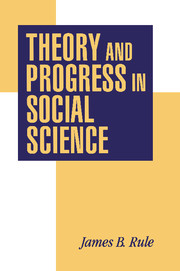7 - Theory as expression
Published online by Cambridge University Press: 05 November 2011
Summary
Whatever one's formal views on the matter, it is hard to overlook the force of the experience of progress in our work. Without some overriding sense of intellectual direction how is anyone to justify any program of inquiry? The wide-ranging theoretical exertions described in the preceding chapters, for example, surely would not have taken place had it not been for a sense among theoretical enthusiasts that they were “moving the field ahead.”
Moreover, our self-presentation to the outside world routinely involves implied or explicit claims for our work as a progressive or cumulative enterprise. The Institute for Advanced Study at Princeton, where these words are being written, describes itself as dedicated to the pursuit of “basic knowledge” – implying unmistakably that some forms of understanding are prior to, and necessary for, others. Similarly, in praising an author, genre of study, or investigation, we aver that the work “advances discussion” or “breaks new ground” – presumably in a direction that all concerned could identify as “ahead.” Conferences are convened, volumes edited, and symposia organized to implement the growth of understanding, or to extend the “frontiers” of knowledge. Books, articles, and doctoral dissertations are judged in terms of whether they constitute “contributions” to knowledge – as though it were transparent what constitutes the established sum of understanding and what meaningfully adds to it.
Information
- Type
- Chapter
- Information
- Theory and Progress in Social Science , pp. 173 - 202Publisher: Cambridge University PressPrint publication year: 1997
